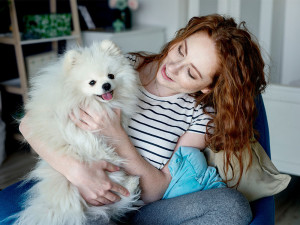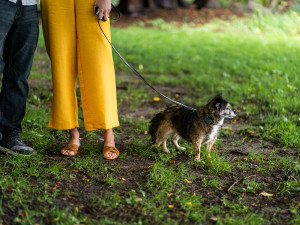Why You Should Adopt a Senior Dog This Month
November is Adopt a Senior Pet Month. Here are all the reasons you should welcome a senior pup into your family.

Share Article
There are tons of proven health benefits to being a pet parent: Studies show that when you raise a pup, your blood pressure goes down, your heart attack risk declines, and your cholesterol levels improve. They’re basically medicine — and that’s not even considering the emotional benefits of the warmth, companionship, and love that pets bring into a home.
In other words, you should probably adopt a dog… and when you do, you should consider adopting a senior dog. Adopting a senior dog means skipping the chewed-up chairs and potty training and going straight to cuddling with your BFF. November is Adopt a Senior Pet Monthopens in new tab, which means it’s the perfect time to bring home an older pup.
Benefits of adopting a senior dog
While they are plenty of benefits to adopting any pup, there are some things that make senior dogs especially great. Here are a few reasons why you should consider caring for a dog in their golden years.
You know what you’re getting.
Adult dogs are settled into their personalities, so you know what you’re getting more than you would with a puppy or yearling who’s still going through some chaotic developmental phases (we’ve all been there). Seniors have already passed through messy puppy stages, so they settle into their homes more quickly than puppies do.
They know all the tricks.
They are usually house-trained, and may already know basic commands like “sit” and “stay.” And don’t believe what you’ve head: You can teach these dogs new tricks — with adolescence out of their systems, they tend to focus pretty well on teaching moments.
They’re grateful.
And I can’t prove it, but I’ve heard it said too many times to discount the notion that adult adoptees are just plain grateful — they’ve seen the world’s harsher side and seem particularly appreciative of the new lease on life they’ve been given.
You can get them at a lower cost.
In recognition of the many mutual benefits of matching older dogs with their humans, many shelters have established “seniors for seniors” programs. They offer reduced adoption fees to folks older than some threshold age for mature dogs — typically six or more years old.
I recall an older gentleman who was looking over some impossibly cute foster puppies. When asked where he planned to be in 10 years, he replied, smiling, “Dirt nap!” With many breed life expectancies in the 12 to 18 year range (smaller being typically longer-lived), six-or seven-year-old dogs — and even teenagers, still have plenty of good “tread-life” on them.
Praise for senior dogs
A shelter in Reno, Nevada, recently received a letter from a woman who had adopted a senior dog there some time ago and then returned for another. She wrote: “Frankie’s time with me was very good. He was loving, gentle and a good friend. He would bound out of the house at the end of the day when I returned home from work. He would wiggle with happiness to see me. He would do those ‘play bows’ that sometimes much younger dogs do.
“I want to tell you that I think I needed Frankie more than he needed me, but he loved me and I was grateful for that wonderful creature every day that I had him. My new girl, Willow, is lying at my feet chewing on a rawhide. I hope this makes sense — I heard her snore last night while I was watching television. I can hear her breathe, and I am not so alone. It is possible that animals are our greatest gifts in this life.”
If you have a hankering for “one more good dog,” please consider adopting an older best friend — it’s one of the biggest win-win opportunities that senior life affords.
Tom Cushing
Tom Cushing works to place stray animals and lawyers into new situations where they may prosper. He lives in the San Francisco Bay Area.
Related articles
![A dog laying on a blue couch and resting its chin on a pillow.]()
Help! My Senior Dog Is Bored!
Physical exercise isn’t the only way to stimulate your dog—engaging their mind works, too.
![Woman in yellow wide leg pants standing next to a man with jeans holding the leash of their small adult dog in a grassy area]()
“Help, My Adult Dog Refuses to Pee Outside”
Kinship Collective dog trainer Robert Haussmann’s tips for helping an adult dog learn to go outside in a new environment.
![Dog lying on the wood floor is bathed in the sunset light]()
When Your Dog Gets Alzheimer’s
For dogs with Alzheimer’s, confusion may reign as light falls.
![Man hugs his dog to his face]()
How Will I Know When It’s Time?
End-of-life veterinary specialist Dr. Shea Cox on how to make the most difficult decision in your pet parenting journey.
![A woman staring at her computer while holding her dog close.]()
10 Things to Consider Before Adopting a Pet
It’s a big decision, so check these boxes before you sign on the dotted line.








